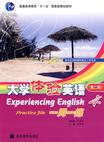大学体验英语一周一练4
出版时间:2008-1 出版社:高等教育出版社 作者:芮燕萍 主编,刘陈艳 分册主编 页数:163
Tag标签:无
前言
近年来,随着我国社会和经济的迅猛发展、国际交往的日益频繁,国家和社会迫切地对大学生的英语综合应用能力尤其是听说技能提出了更高的要求。大学英语教学又面临着新的挑战,这使得大学英语教学必须进一步深化。另一方面,我国的大学英语教学环境正在逐步改善,多媒体、网络等现代教育手段的发展使大英语教学多样化、个性化有了可能。许多教师已经开始利用多媒体和网络技术进行英语教学改革,以弥补传统教学的不足,并取得了一定的成绩。基于计算机/网络+课堂教学的教学模式日渐普遍。 教育部2007年颁布的《大学英语课程教学要求》贯彻了分类指导、大力推广应用信息技术、共享优质教育资源的原则和方针。提出加强听说,同时也更重视培养阅读理解能力、翻译技巧和基本写作能力等英语综合应用能力的要求;注重以学生为主体、促进个性化学习和自主学习。因此,大学英语教学课时数在一定程度上进行了缩减,包括听力课课时。而全国四、六级英语考试听力部分分值和题型都在这一改革的背景下进行了很大程度的调整,增加了考查学生应用能力的题型,听力分值也由原来的20%提高到了35%,。新的要求给大学英语教学带来了压力和挑战。 因此,我们必须致力于探索在学时减少、对听说能力要求提高的情况下,如何加强对学生学习策略能力的训练,培养学生自主学习的新模式。 《大学体验英语一周一练》为大学体验英语课外练习系列,共分四册,供普通院校非英语专、Ik一、二年级学生及有相当水平的学习者使用。 实践性是外语教学的特征。如何使练习题具有较强的实践性,题型设计至关重要。本书提供了大学英语一至四级的试题练习,每册十个单元,分别供一至四学期使用。考虑到使用一册的学生听力相对较弱,因此练习题针对学生水平,遵照循序渐进的原则进行设计。二至四册则严格按照大学英语四级考试标准题型编写,经过反复审查、修改、提炼、测试最终得以完成。练习题还具有较强的实用性和一定的趣味性。教师可以根据教学进度和学生学习情况选择试题进行测试,或者指导学生进行自主学习。 本书全部听力内容由资深外籍专家朗读,并随书附MP3光盘以方便学生使用。 由于本书编写时间较为仓促,编写人员水平有限,书中不完善之处在所难免,恳请使用本书的广大师生提出宝贵意见和建议,以便我们今后的修订、提高和完善。
内容概要
1 注重实用表达能力的培养:在语言基础训练中加大听力和口语的学习内容,加强实用阅读、实用会话、实用写作的训练,培养学习者英语综合运用能力和在涉外交际中的实用表达能力。 2 注重教材的可操练性:选文短小精悍,生动有趣,便于听、说、读、写、译的训练:练习设计层层深入,通过训练达到学懂、会用的教学目的。 3 强调以人为本,突出“个性化”学习:注重学习者在整个学习过程中自主学习的引导,强调学习者在体验语言的立体化环境中获得语言知识,体验用英语表达和交流思想的美妙。 4 重视文化知识的学习,培养“跨文化意识”:提供大量真实的图片、富有时代感的文字材料以及英语国家丰富的文化背景,开拓学习者的视野。 5 立体化教材为英语学习提供全方位服务:文字版、网络版、电子教案以及多媒体学习课件等提供了立体、互动的英语学习环境。
书籍目录
Model Test 1Model Test 2Model Test 3Model Test 4Model Test 5Model Test 6Model Test 7Model Test 8Model Test 9Model Test 10
章节摘录
Why are so many people so afraid of failure? Quite simply because no one tells us how to fail so that failure becomes a growing experience. We forget that failure is part of the human condition and that: as family therapist Virginia Satir observes: "every person has the right to fail." Most parents work hard at either preventing failure or protecting their children from the knowledge that they have failed. One way is to lower standards. A mother describes her childs hastily made table as "perfect!" even though it wobbles (摇晃) on unevenness. Another way is to shift the blame. If John fails science: his teacher is unfair or stupid. When one of my daughters was ten: she decided to raise money for charity by holding a carnival (狂欢节). Proud of her: we rashly allowed her to put posters all Over town. We real- ized too late that she couldnt possibly handle all the refreshments: shows and games prom- ised in the posters. The whole family pitched in to prevent embarrassing failure and the next year she advertised an even more ambitious event. Why not? We had kept her from discover- ing her limitations. The trouble with failure-prevention devices is that they leave a child unequipped for life in the real world. The young need to learn that no one can be best at everything: no one can win all the time and that its possible to enjoy a game even when you dont win. A child whos not invited to a birthday party: who doesnt make the honor roll or the baseball team feels ter- rible: of course. But parents should not offer a quick consolation prize or say: "It doesnt mat- ter:" because it does. The youngster should be allowed to experience disappointment —— and then be helped to master it. Failure is never pleasurable. It hurts adults and children alike. But it can make a positive contribution to your life once you learn to use it. Step one is to ask: "Why did I fail?" Resist the natural impulse to blame someone else. Ask yourself what you did wrong: how you can improve. If someone else can help: dont be shy about inquiring. When I was a teenager: I failed to get a job Id counted on. I telephoned the interviewer to ask why. "Because you came ten minutes late:" I was told. "We cant afford employees who waste other peoples time." The explanation was reassuring (I hadnt been rejected as a per- son) and helpful: too. I dont think Ive been late for anything since. Success: which encourages repetition of old behavior: is not nearly as good a teacher as failure. You can learn from a disastrous party how to give a good one; from an ill-chosen first house what to look for in a second. Even a failure that seems definitive can prompt flesh thinking: a change of direction. After 12 years of studying ballet a friend of mine auditioned (试演) for a professional company. She was turned down. "Would further training help?" she asked. The ballet master shook his head. "You will never be a dancer:" he said. "You havent the body for it." In such cases: the way to use failure is to take stock courageously: asking: "What have I left? What else can I do?" My friend put away her toe shoes and moved into dance therapy: a field where shes both competent and useful. Oddly enough: failure often brings with it a peculiar kind of freedom. Even a major life failure can be followed by a sense of "Its happened. I wish it hadnt: but its over now and I survived."
图书封面
图书标签Tags
无
评论、评分、阅读与下载
用户评论 (总计2条)
- 服务态度好好
- 书应该是正品,包装的很好,这本书没有破损,反而是另外一本书的书装订部位断了,我郁闷,发货员应该发了一本坏书给我了。
